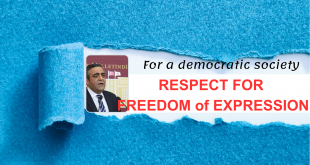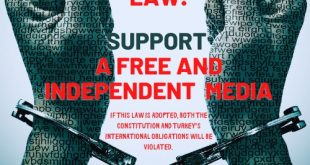Freedom of Expression is the prerequisite for a democratic regime and the autonomy of the individual. It is the medium for breathing life and spirit in the approach and understanding that the ideas cannot be tested in an environment of fear and repression but rather in an environment of fearless and continuous discussion, as a result of which it will be possible to find out whether or not they have the ability of guiding us in the direction of truth.
Each and every individual has the right of self-development regardless of the belief, political tendency, cultural approach or philosophical understanding. Any limitation to what we write, say or hear is a blow to the development of our personality. The right of Freedom of Expression regarding the political thoughts and beliefs is one of the basic properties distinguishing us as a human being. Maturing individuals do not only produce for their own benefit but they also contribute to the maturity and development of the community as a whole. We have no alternative but to accept the Freedom of Expression, including and encompassing the cultural rights, belief and freedom of religion, with the widest possible borders if we have an interest in and desire of the development of the intellectual capacity of the individual.
Each individual has the right to participate in the administration and to produce political views. Providing the means to the individual to exhibit his/her reactions and eliminating all obstructions that could lead to the annihilation of the ability to react must be considered as the basic conditions of living in a democracy.
The meaning of Freedom of Expression in the current international law is that the individual must have free access to thoughts and knowledge, should not be subject to any accusation because of his/her thoughts and opinions, must have the right to freely announce, defend, transmit to others and propagate (speech, press, picture, cinema, theater, etc) these thoughts and opinions by himself/herself or together with others (association, political party, meeting, etc.).
In this framework, the freedom of thought has been included in the scope of many international agreements. The most fundamental arrangements in this field are included in the International Treaty on the United Nations Civil and Political Rights and European Treaty for Human Rights, to which Turkey is also a party.
It has been underlined in the article 19 of the International Treaty on the Civil and Political Rights that every individual has the right for free speech. This right encompasses the freedom to conduct research on, take and give all kinds of news and opinions whether in oral, written, and published form or in form of art or in any other form that will be chosen regardless of the country borders. Everybody has the right of developing opinions in any selected way without being subject to interventions.
It has been laid down in the article 10 of the European Human Rights Treaty that every individual has the right to express the opinions and that the freedom to hear ideas or talk about the ideas or news and freedom of having opinions without any intervention on the part of public authorities is included in the right mentioned above.
There is no “crime of thought” or “crime of propaganda” in the contemporary pluralistic democracy, whereby clearly insulting others and advocating violence will be considered as the exception.
The freedom of thought and crime of thought has always been one of the most controversial issues in the field of human rights in Turkey. The restrictions of the Freedom of Expression deviating from the international standards, whether at the level of legal arrangements or at the level of interpretation media used for the implementation of the legal rules, are based on certain views in the background that are considered as taboos. We witness from time to time that such taboos will be protected by the legal system.
The western states and Europe have had a share in such negative developments. Along with the fascistic ideologies that were adopted in Europe prior to the World War II as well as other ideas nurtured in the West opposing the freedom of thought, the fact that Turkey was considered to be a forward watch station by the western countries, that they have disregarded the paranoia that penetrated in and took control of the political system and that they even supported such unhealthy development, particularly during the Cold War, has made it possible that the “restrictions regime” was able to maintain its existence with support from outside.
Building an environment and structure conducive to free thought with all aspects, which has been delayed for 80 years in Turkey as a result of domestic and foreign reasons, is a must now.
As the Human Rights Joint Platform established by HELSINKI CITIZENS’ ASSEMBLY, HUMAN RIGHTS ASSOCIATION, the ORGANIZATION OF HUMAN RIGHTS AND SOLIDARITY FOR OPPRESSED PEOPLE and AMNESTY INTERNATIONAL TURKEY, we are starting the “Campaign for Freedom of Thought” with the aim of eliminating the barriers obstructing Freedom of Expression and thought in Turkey. The target of this campaign is the elimination of the legal rules and rulings as well as the applications that restrict the freedom of thought. In this framework, we demand the abolishment of the article 301 of the Turkish Criminal Code and the amendment of the articles in the Turkish Criminal Code and the Turkish Civil Code that restrict the Freedom of Expression.
We invite everybody that respects and adopts the human rights and freedoms to support this campaign and furthermore invite the Turkish Parliament and the Turkish government to make the necessary arrangements to fulfill the request brought forward in this campaign.
Let's Talk Free from Bans, Fears, and Threats!
 HRJP Human Rights Joint Platform
HRJP Human Rights Joint Platform



